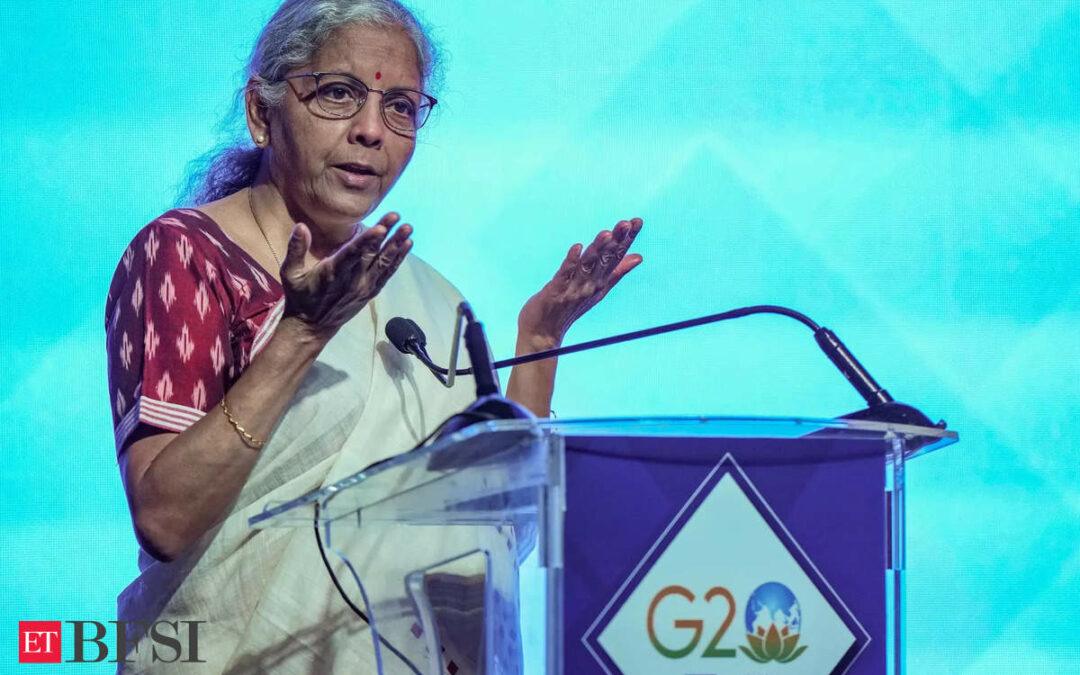The international community must collaborate and find stronger ways to coordinate debt restructuring for low-income and vulnerable middle-income countries facing debt distress, Union finance minister Nirmala Sitharaman said addressing at a seminar on Global Economy, hosted by DEA, GOI and RBI under G20 meeting.
“By restructuring existing debts and enhancing access to affordable finance, the international community can contribute to raising financial resources in debtor countries to shield vulnerable populations from economic hardships. In this era of technological transformation, unlocking the full potential of digital progress for all is essential for a fair and inclusive future,” she said addressing the meeting being held in Mumbai virtually.
“We have made significant efforts this year in providing momentum for debt treatment for some countries. The G20 also stressed the criticality of addressing debt vulnerabilities in low- and middle-income countries through an effective, comprehensive and systematic approach,” Sitharaman said.
Financial inclusion
The G20 Policy and the G20 Policy Recommendations for Advancing Financial Inclusion and Productivity through DPI meticulously developed under India’s leadership have garnered unanimous acceptance across the G20 membership. she said. “These can guide both G20 and non-G20 countries in harnessing DPI for inclusive and robust growth. We are striving to lay the foundation for a robust regulatory landscape that encourages innovation while ensuring macroeconomic and financial stability,” she added.
The upcoming synthesis paper developed by the IMF and the FSP coupled with the roadmap will be instrumental in shaping future regulatory measures for crypto assets, Sitharaman said.
“As we move towards the legal summit in September 2023, we stand committed to facilitating a secure and dynamic natural environment that benefits all nations and fosters inclusive growth,” she said.
The Indian G20 Presidency has also emphasized innovative financing models to mobilize private sector investment and address the infrastructure financing gap crucial for building future cities.
“We have laid the groundwork for the G20 Principles for Financing Cities of Tomorrow.
This framework holds the potential to guide NDDs and other development financing institutions in their planning and financing of sustainable urban infrastructure. The support and endorsement from G20 members further affirm the importance of our work in shaping cities that exhibit resilience and are vital parts of growth and opportunity,” Sitharaman said.
Digital public infrastructure
Under the Indian G20 Presidency, the digital public infrastructure has been integrated into G20 discussions, she said, adding, “This member country is recognising its capacity to enhance productivity and also to react properly to financial institutions.”
Despite vulnerable advancements, disparities in access, usage and quality of financial services persist among vulnerable populations and micro, small and medium enterprises.
A primary focus of the Indian G20 Presidency in 2023 has been to strengthen multilateral development banks to address the shared global challenges of the 21st century. MDBs are facing the shared global challenges of the 21st century, but MDBs are facing increasing demands from donor and from borrowing countries to expand their lending operations beyond their core development mandates.
“However, MDBs are currently not equipped to address this rising demand for their resources and equipment. To explore possible solutions that can constructively contribute to the efforts that MDBs are undertaking, the Indian G20 Presidency is set up as an independent expert group on strengthening MDBs,” she said.











